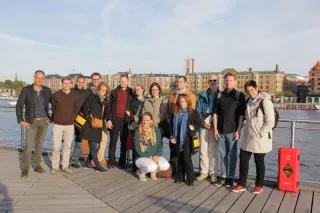
Regional cooperation can play a key role in meeting the EU'S climate and energy targets for the year 2020. By organising a North Sea study tour with various regional stakeholders we put theory into practice.
In five days in September 2016, 13 policy-makers and shapers from 9 countries travelled 1.500 kilometres from Denmark via Germany and the Netherlands to Belgium. Their mission? Exploring what regional renewables cooperation means in practice and how it can boost renewable energy in Europe. The group travelled from Copenhagen via Sønderborg, Flensburg, Hamburg, Eemshaven, Groningen, Assen, Koornwerderzand and Ghent to Brussels and met with project developers, local, regional and national administrators and politicians to discuss the chances and the challenges of regional renewables cooperation. This 5-day tour served as a platform for in-depth learning about existing and possible future cooperation and provided thoughts, inspiration, opportunities and contacts to the participants. Watch this film to learn more about the tour. In a final meeting in the European Parliament, these insights were shared with representatives from the European Parliament and Commission.
This was the most recent activity that the Heinrich Böll Foundation EU Office has organised together with the World Future Council in the framework of HBF’s #Regions4GreenEconomy and the Global 100% RE Campaign #Go100RE. On this page, you can find all relevant information regarding the study tour and further information.
Please find all presentations for download in the sidebar.
Renewable Energy - Regional Cooperation Study Tour - Heinrich-Böll-Stiftung European Union
 Watch on YouTube
Watch on YouTube
Renewable Energy - Regional Cooperation Study Tour - Heinrich-Böll-Stiftung European Union
 Watch on YouTube
Watch on YouTube
Background
Renewable energy sources (RES) will have to play a predominant role in EU’s future energy mix. However, the current policy and regulatory framework does not entirely facilitate this transition but instead reflects a business-as-usual approach. The current RE target on EU level in the Climate and Energy 2030 Framework lacks ambition with regards to the low goal setting of “at least 27%” and due to its “EU-wide” level approach without member state contributions. In light of this weak policy framework, there is one mechanism, which may still help to increase the share of renewables to the scale and speed needed to counter today’s challenges: The idea of regional cooperations.
Regional cooperation can effectively bridge the gap between national renewable energy policies and a Europeanised approach to renewable energy deployment. Additionally, regional action across borders allows for participation of non-state actors, possibly a higher political legitimacy and fitted solutions for local conditions. A common cross-border identity might be facilitated through these projects and the revenue generated by the decentralized energy plants is more likely to stay within the region.
The study “Driving Regional Cooperation Forward in the 2030 Renewable Energy Framework”, written by the consultancy Ecofys on behalf of the Heinrich Böll Foundation’s EU Office (HBF EU), explores the potential benefits of regional renewables cooperation and provides policy suggestions on how such cooperation can effectively be enhanced. In addition, findings from the World Future Council`s programme on 100% Renewable Energyn the EU show that there is a window of opportunity for adapting the legislative framework to strengthen regional cooperation on renewable energy. To harvest this potential and develop a strategy for implementation, a comprehensive and inclusive policy dialogue is needed to a) build cross-sectorial and multi-level-governance networks, b) learn from pioneering regions and pilot projects and c) build political momentum for the topic.
